Top Open Source CMS Powered by PHP Frameworks Laravel and Symfony

Explore the best open-source CMS solutions powered by PHP frameworks Laravel and Symfony. Unlock robust functionalities, ease of use, and seamless integration with our top picks.

Join 2000+ tech leaders
A digest from our CEO on technology, talent and hard truth. Get it straight to your inbox every two weeks.
No SPAM. Unsubscribe anytime.
For any aspiring business, a healthy and professional digital presence is instrumental to its success in the modern marketing landscape. Luckily, it no longer takes a degree in software development to build an engaging and efficient website for your business. Top CMS platforms step in to do the job.
Whether you’re a startup CEO or a project manager in charge of e-commerce platforms or digital products, website management is one of your core concerns. What CMS should you choose? Should you opt-in for a premium or free CMS website builder software?
Look no further – here’s your guide to everything you need to know about content management systems running on PHP frameworks. But first, let’s catch up with the basics.
What is a CMS platform?
In a nutshell, a content management system (CMS) is software that allows you to manage digital assets. This encompasses anything from content and graphics to design and code. As a webmaster, you’re going to use the CMS for your website every day, which is why it’s vital to pick a top platform to suit your needs.
How many types of content management systems are there?
- An open-source CMS like WordPress, Magento, or Joomla, is free and customizable but may require expert help for setup. Enhance with plugins and add-ons for endless possibilities.
- A proprietary CMS like IBM Enterprise Content Management or Shopify, requires licensing fees and can be extensively customized, but may become costly without a feature-rich initial platform.
- Cost-effective SaaS CMS platforms are popular among small and mid-sized businesses, offering CMS, technical support, and web hosting. Users can choose fully or partially cloud-based options.
Essential features to look for in your content management system
Outstanding CMS tools written with PHP latest technologies take the content management process to a new level. If you want to manage your information smoothly and efficiently, these are some of the must-have features to look in your content management system:
- Customized content templates: 📝🎨
- User-friendly interface, or a WYSIWYG editor (What You See Is What You Get): 👁️🖥️✨
- Advanced content organization (content taxonomy and hierarchy): 🗂️🌳
- Permission-based access to content: 🔑🔒📄
- Content workflow and version control: 🔄📚
- Multi-lingual support: 🌍🗣️
- Compliance with web development standards and SEO requirements: 🌐🔍🚀
- Easy team collaboration: 👥🤝🛠️
Based on your unique requirements, you might also want your content management system to integrate with your CRM system.
CMS requirements
The fundamental questions you should be asking yourself about your CMS are:
- Do I employ a large team in need of advanced collaboration features?
- What’s the frequency of my content updates?
- Do I need version and workflow control of my content?
- Do I need content templates?
- Do I need to customize my CMS heavily?
- What skills do I need to run this specific CMS? Would I have to hire more support staff?
- What are the total costs of using this content management system?
And once you’ve figured out the answers to these questions, you can move on to the top content management systems running on Symfony and Laravel as well as a quick CMS comparison.
Top PHP CMS platforms powered by Symfony Framework
1. Fork
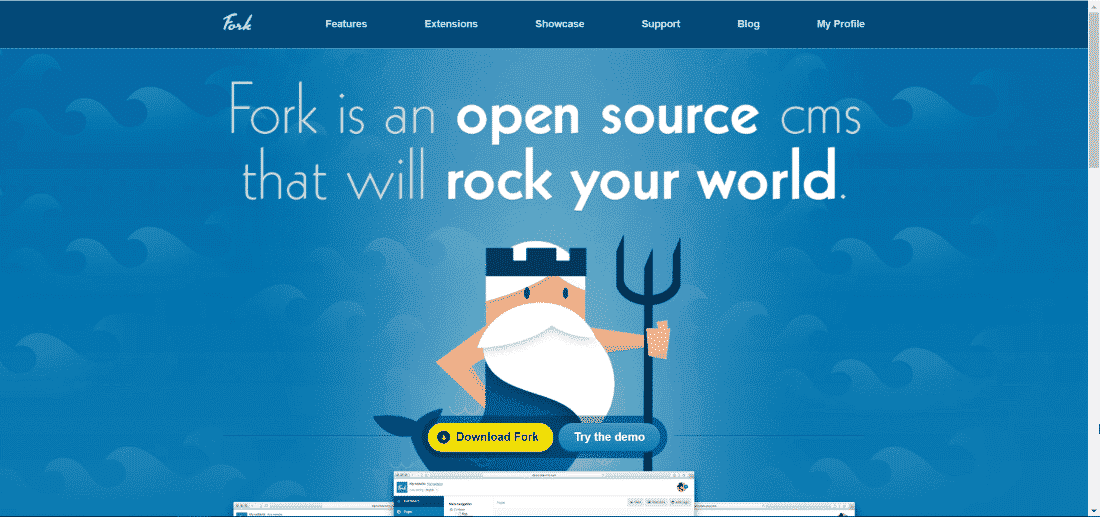
Fork is a free open-source PHP CMS packed with useful features. One of the most outstanding is a user-friendly admin area. Fork CMS enables its users to create and edit websites without resorting to actual coding.
Fork CMS key features for websites are:
- an intuitive interface equally handy for newbies and pros;
- multiple built-in apps (e.g., banner campaigns, guestbook, form builders, image compression and more);
- multiple website themes;
- Google Analytics integration to display website analytics directly in your Fork PHP CMS dashboard;
- Campaign Monitor integration to run email campaigns from your Fork CMS dashboard.
2. Bolt
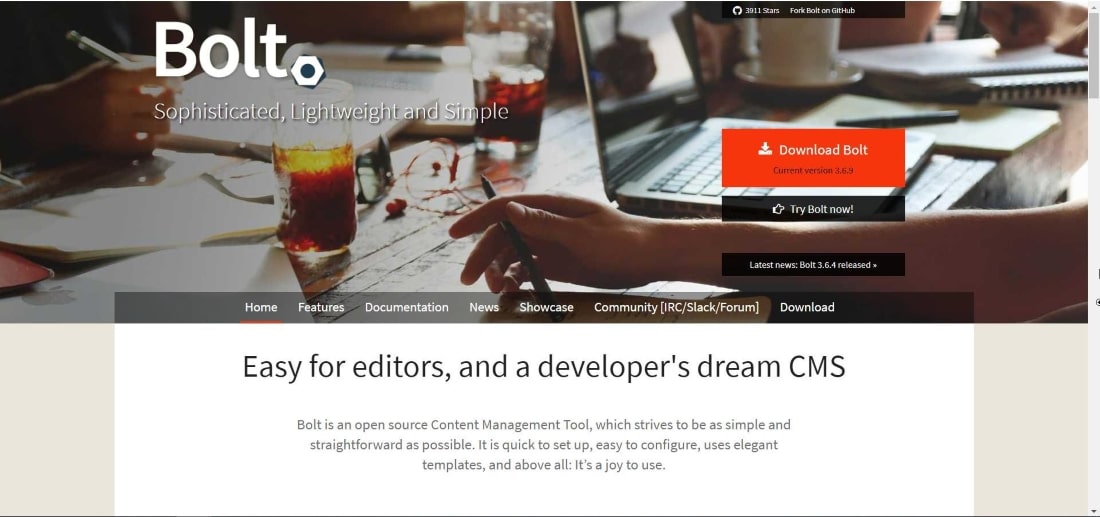
Bolt is a free CMS website builder software that has everything to help you build a compelling personal or commercial website. Based on PHP, it delivers an open-source architecture and a whole pack of great features:
- a responsive content management system that both looks and works great across a variety of devices;
- Twig templates that do not require knowledge of PHP;
- multiple content types to display on a website;
- changelog and file manager;
- a fast CMS with reasonably low memory usage;
- all code hosted on GitHub (a useful feature for website developers).
All in all, Bolt is one of the best-looking CMS with powerful benefits for content editors. Not only this CMS is fast, secure and flexible, it’s also lightweight and modern.
3. Sulu
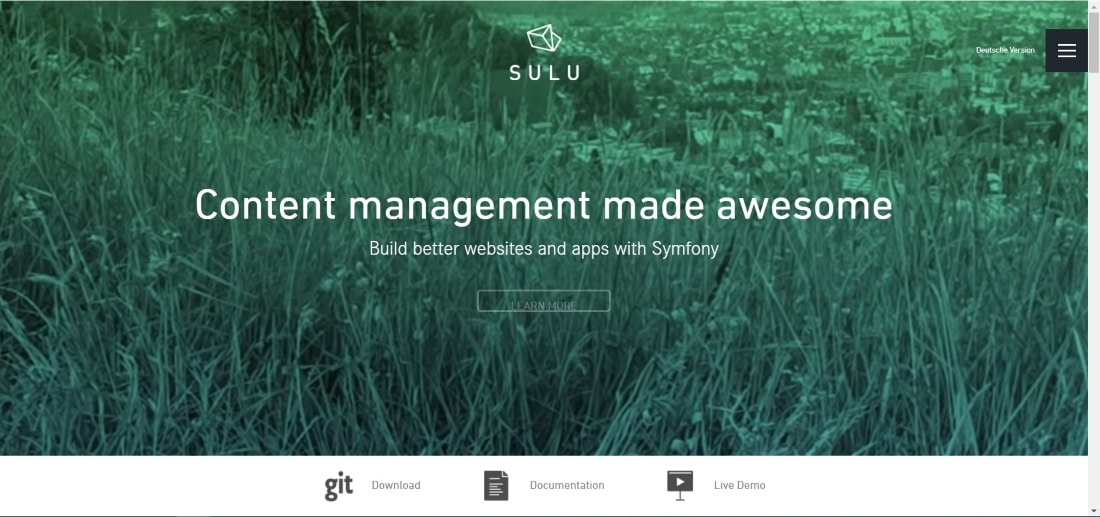
Sulu is an open-source, PHP-based content management system with a lens on flexibility. Whether you need to build a website or app, Sulu provides the multi-lingual, multi-channel, and multi-portal infrastructure to enable your website.
Key Sulu CMS features:
- integrates data from external resources;
- web-based, no installation or download required;
- fast and user-friendly interface;
- content editing available across mobile, tablet, and desktop;
- live content preview of website content.
On top of that, Sulu CMS allows you to enhance your website or app with custom modules (bundles). Full PHP Symfony stack ensures that the website development process is flexible and orderly.
4. Sylius

An open-source content management system, Sylius specifically targets e-commerce websites. Not only is it one of the best looking CMS PHP tools, it also comes with an impressive portfolio of features for e-commerce stores:
- cross-device compatibility;
- integration with business tools: CRMs, email service providers, ERP, PIM and inventory management solutions;
- invoicing, order processing and multiple payment options including PayPal, Visa, Mastercard, American Express and more;
- customizable and flexible checkout experience;
- product management;
- shipping, refunds and taxes, and much more.
A customizable admin area of the Sylius content management system allows website owners to build a familiar and easy-to-use area that doesn’t turn daily activities into a chore.
5. Pimcore
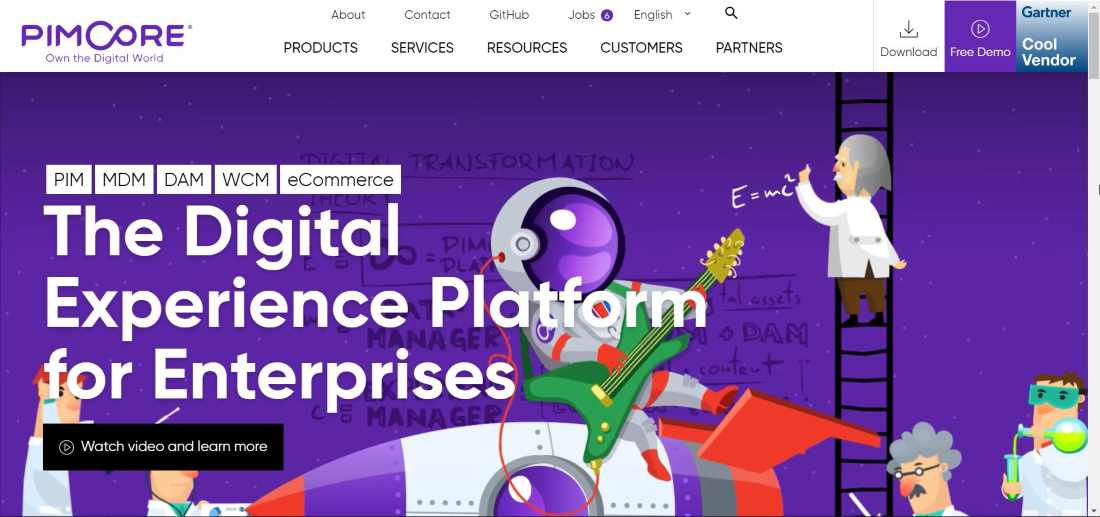
Pimcore rightfully claims its place among the top content management systems on the market. It designed a robust and feature-rich CMS platform that is also open-source and free for all. Pimcore CMS framework is powered by PHP-based Symfony.
Pimcore CMS key features are tied into its products:
- product information management (PIM) solution which harmonizes sales, marketing, and technical data;
- master data management (MDM) solution which brings all of your data records, documentation, attributes, and more under one umbrella;
- digital asset management (DAM) solution which consolidates all of your digital media resources and eliminates data silos;
- website content management (WCM) solution which incorporates everything from content ideation to analytics and workflows;
- digital commerce platform which offers exceptional support for B2C and B2B marketplaces.
Top PHP CMS platforms powered by Laravel Framework
1. October
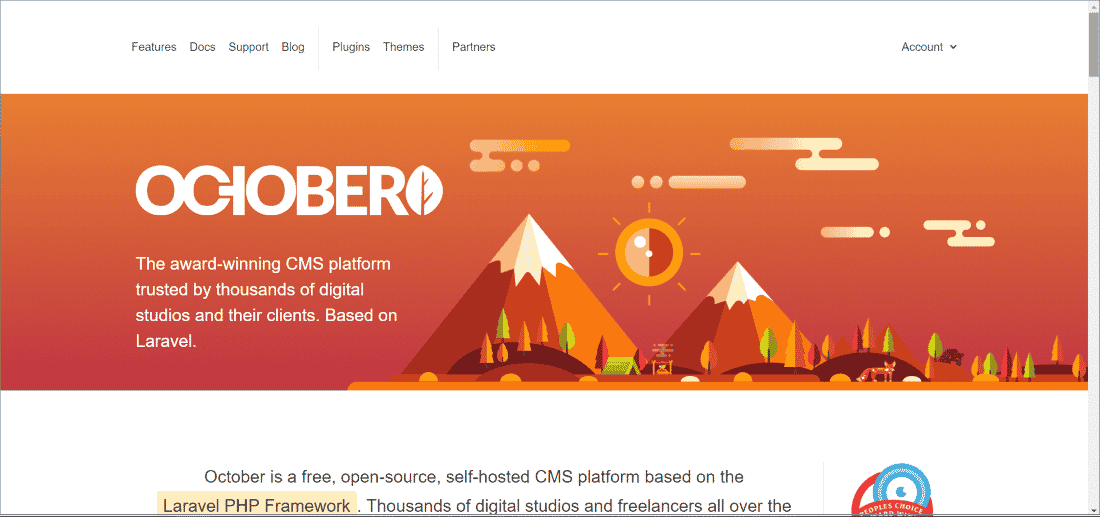
October CMS is a free CMS website builder software powered by the popular PHP Laravel framework. It comes with 700+ plugins and themes to give your website a unique look and feel.
The key features of October CMS:
- elegant and simple Twig templates;
- a component-based website page structure and easy-to-use WYSIWYG editor;
- content delivery network (CDN) support and file management;
- out of the box free Translate plugin for multi-lingual website support.
October content management system strives to make its interface as uncluttered as possible. Its core functionality encompasses creating and publishing website pages. To add anything else, you’ll have to resort to its large collection of plugins.
2. Lavalite
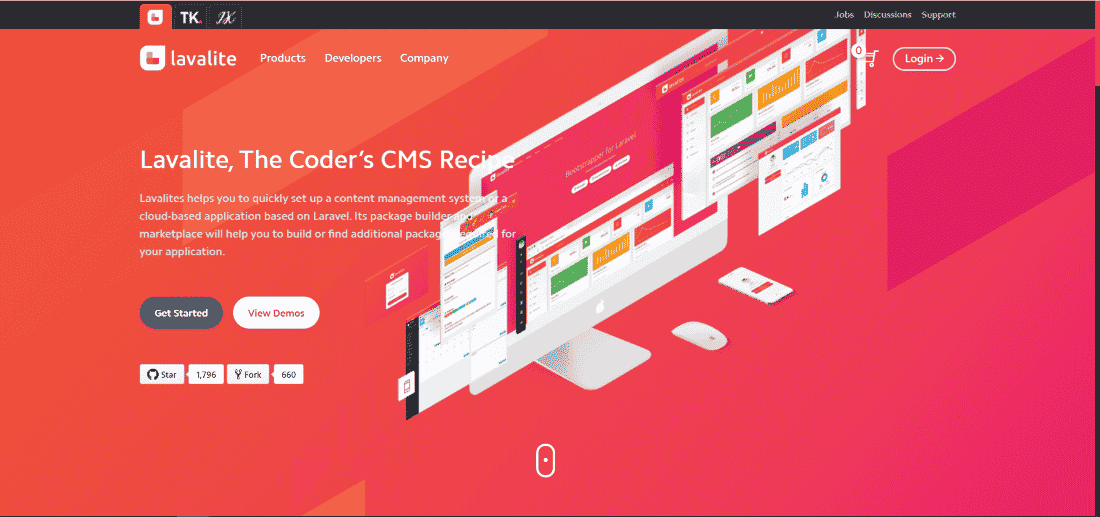
Another one of the top content management systems, Lavalite CMS relies on the PHP Laravel framework. It positions itself as a simplistic and modern CMS. This developer-focused content management system is also open-source and free to use.
The key features of Lavalite CMS are:
- responsive layout;
- lightweight and simple user interface;
- ready-made packages for real estate, e-commerce, classifieds, job search websites, automobile classifieds and yellow pages;
- custom taxonomies;
- multi-lingual website support.
The team at Lavalite.org CMS delivers round-the-clock support which will get your business covered at all times.
3. Photon
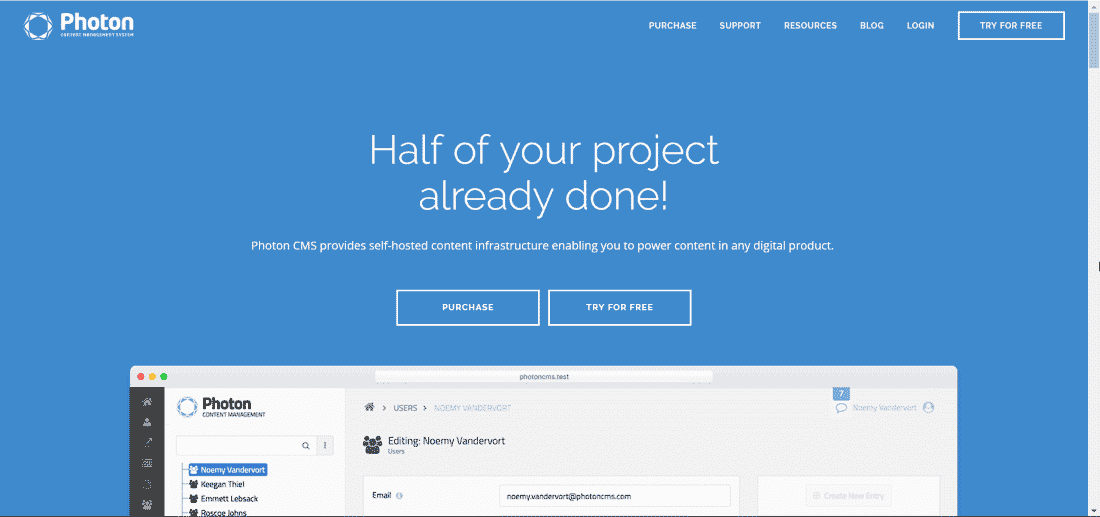
Photon CMS claims to do half of your website development work with its platform which is based on the PHP Laravel framework. Its self-hosted content management system is well-suited to manage a variety of digital assets and is quite developer-friendly.
The key features of Photon CMS are:
- team project sync;
- responsive control panel;
- 20+ field types to customize admin area modules;
- complete RESTFUL and internal APIs;
- generator validation and change reporting and more.
Photon features extensive CMS and API documentation on its website. It also hosts dedicated GitHub and Slack discussion forums. Pricing starts at $49 for personal websites with wordmark attribution. Pricing for commercial websites starts at $199 per website.
4. Atlantis
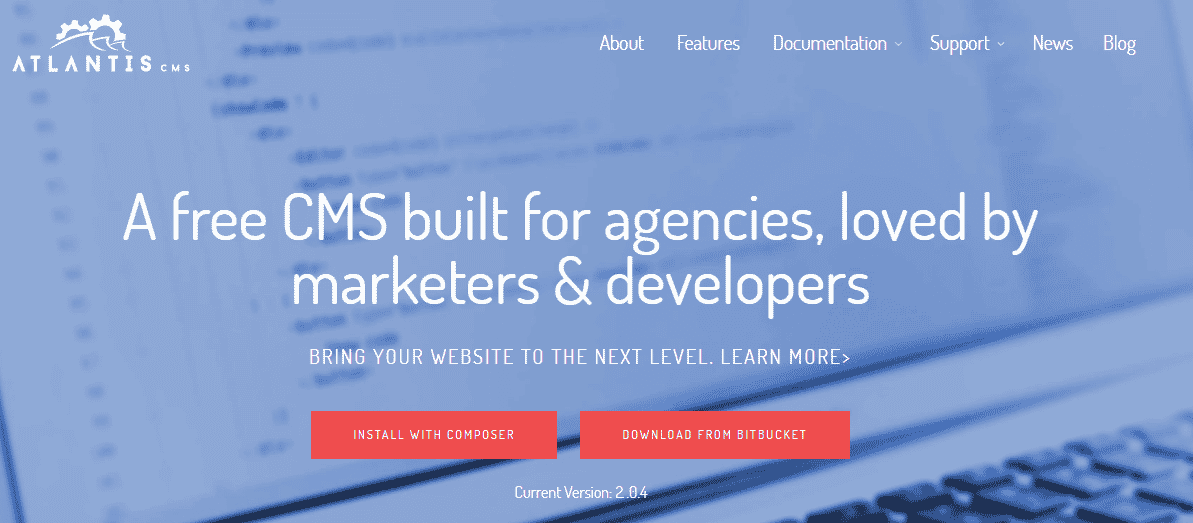
Atlantis is a free CMS website builder software powered by the Laravel PHP framework. Atlantis content management system works well for marketers and agencies as well as PHP developers.
The key features of AtlantisCMS are:
- integrated SEO tools;
- page creation and editing does not require any coding skills;
- instant graphics optimization for mobile devices;
- real-time version control;
- visual, user-friendly admin area with layouts, menus and templates;
- support for custom website themes;
- extendable architecture.
Overall, Atlantis does a great job of simplifying the CMS user experience for developers and content editors alike.
5. Coaster
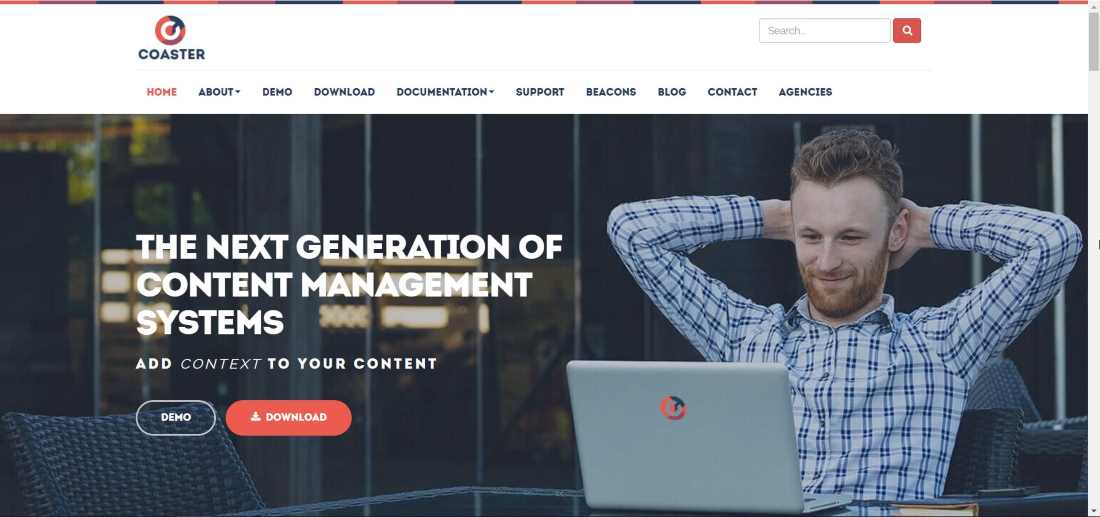
Coaster CMS is a free open-source content management system based on the Laravel PHP framework. Among other features, Coaster CMS has a strong focus on SEO. In particular, it automatically generates an XML sitemap and performs 301 redirects. Other prominent CMS features include:
- beacon compatibility;
- OOP framework;
- version control and publishing system;
- built-in contact forms;
- multiple menus;
- developer-friendly and secure.
When it comes to the content management system comparison, Coaster outperforms Joomla and WordPress in terms of SEO and basic functionality. Being an open-source CMS platform, it’s a viable choice for many businesses.
6. Twill: an open source CMS toolkit
Twill, an open-source Laravel package, enables developers to swiftly develop a customized CMS that boasts aesthetic appeal, robust capabilities, and adaptability. By streamlining routine operations without sacrificing developer autonomy, Twill simplifies the creation of a feature-packed admin interface tailored to contemporary publishing requirements.
7. TypiCMS
TypiCMS is a versatile, multilingual content management platform developed using Laravel. It comes preconfigured to handle pages, events, news articles, locations, navigation menus, translations, and more.
8. Statamic
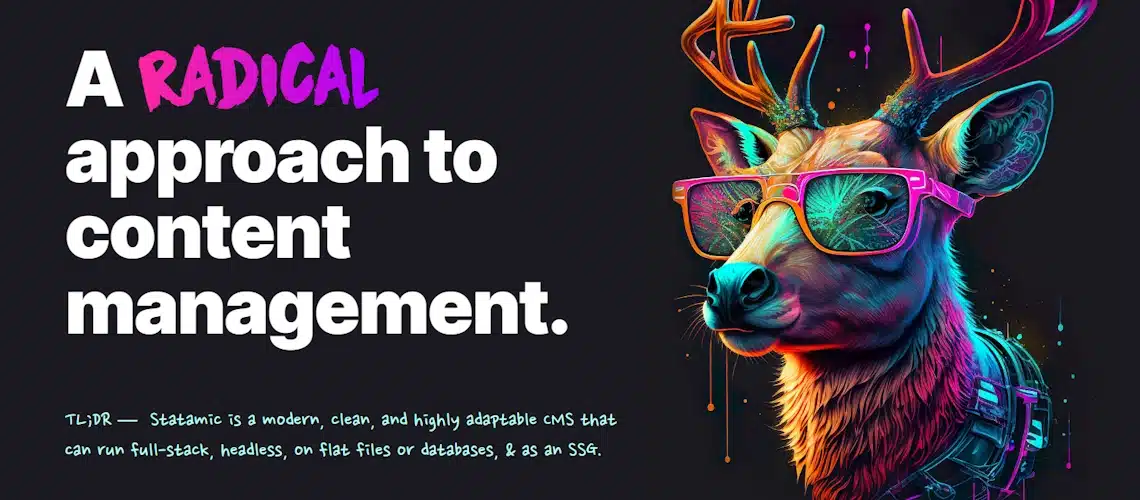
Statamic is a content management system (CMS) that is built on top of the Laravel PHP framework. It was created to provide an alternative to traditional database-driven CMS platforms, such as WordPress, Drupal, or Joomla. Instead of relying on a database to store and manage content, Statamic uses flat files (usually in Markdown, YAML, or other text formats) to store content, configuration settings, and other data.
Typical Custom CMS Projects you can Build with Echo
- CMS & E-Commerce Development for Furniture Retailer
- Outsourced Web Dev for CMS Dev & SI Firm
- Staff Augmentation & CMS Dev for Home & Living E-Commerce Co
- Web & Custom CMS Development for Religious Nonprofit
- Umbraco CMS Dev for Web Development Agency
- CMS for Software Dev and Consulting Company
Frequently Asked Questions
How to choose the right CMS
With so many options on the market, it’s certainly not an easy question to answer. This quick recap of the key criteria will help you out:
- 🔒 Security
- 💲 Costs
- 🤸 Flexibility
- 👍 Ease of use
- 📦 Default out of the box features
- 🌐 Type
- 👩💼 The need to hire someone to manage the CMS platform
- 🛠️ Customization
Armed with all of this knowledge, you are now one step closer to making an educated decision on which content management system is right for you.
Remember, though, that even the most flexible and customizable CMS platforms may not fully address your unique business needs. In this case, it makes sense to develop a custom CMS platform uniquely tailored for your business, or design standalone website solutions that can be integrated into your existing content management system.
Using some other great CMS powered by PHP?
We’d love to hear from you. Do not hesitate to share your insights in the comments below!
Tags: cms, content management, framework, laravel, open source.



Think Spinub CMS (https://www.spinub.com) must be here as well. The Spinub CMS is released a year ago and is growing fast. Spinub is a SaaS CMS that connects to the database of the application. In Spinub you define your users, clients and your database mapping, and the data stays on your application server.
What about Statamic (Laravel)?
Thanks, Michael. Statamic looks good. We will try to add it soon.
What about Twill and TypiCMS as Laravel CMSs? They are very popular.
I’m trying atlantis now .. (I don’t see any cart on them).
thank you.. you are pretty..
Any tutorials about migrating from wordpress to any of those CMS?